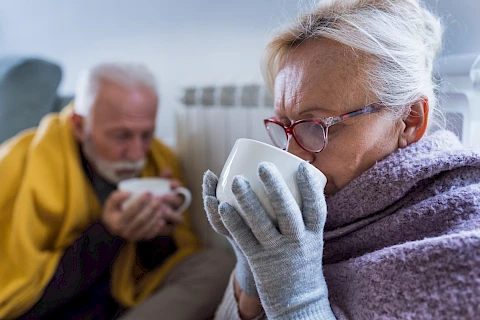
Winter can be a beautiful time of year in Oregon, but it can also bring cold weather and icy conditions. These challenges can be dangerous for seniors, who may be more susceptible to injuries from falls or other issues caused by the cold temperatures. Caregivers play an essential role in protecting seniors during the winter. Here are our top tips for senior safety in the winter.
Fall Prevention
Preventing falls is one of the most important tasks caregivers face during winter. Ice and snow increase the risk of slips, both outside and inside. Here's how to reduce those risks:
- Ensure that paths and driveways are clear of ice and snow. Use salt or sand to increase traction.
- Keep floors dry and clutter-free to prevent tripping indoors.
- Make sure rugs are secure, and consider using non-slip mats.
- Encourage seniors to wear shoes with non-slip soles.
- Consider mobility aids like canes or walkers to help maintain balance.
- Check that mobility aids are in good condition before winter starts.
Maintaining a Warm Home Environment
Seniors are particularly vulnerable to the cold, so maintaining a warm home environment is essential. Proper heating and insulation can prevent many cold-related illnesses.
Before the temperature drops, check that the heating system is working efficiently. Change filters regularly and have the system serviced if necessary. Ensure that windows and doors are correctly sealed to prevent drafts.
Encourage seniors to layer their clothing. Multiple layers help retain warmth more efficiently than a single heavy coat. Additionally, using blankets during rest is a simple way to keep warm. Space heaters can be used for extra warmth, but remember to keep them safe from any flammable materials.
Ensuring Proper Nutrition and Hydration
Proper nutrition and hydration are vital for maintaining health during winter. Ensure seniors eat a balanced diet to help their bodies produce the necessary warmth.
Plan meals that include a variety of nutrients, like soups rich in vegetables and lean meats. These not only provide nutrition but also warmth. If shopping becomes difficult due to weather, stock up on non-perishables and easy-to-prepare foods.
Encourage regular fluid intake, even if seniors feel less thirsty in cold weather. Warm drinks like herbal teas can be more appealing and help maintain hydration. Be vigilant for signs of dehydration, such as dry skin, fatigue, or confusion, and encourage fluids throughout the day.
Recognizing Signs of Hypothermia and Frostbite
Hypothermia and frostbite are serious risks for seniors in winter. Being aware of the signs can prevent these conditions from becoming life-threatening.
- Hypothermia occurs when body temperature drops too low. Look for symptoms such as shivering, slurred speech, and sluggishness. In severe cases, it may cause confusion or unconsciousness.
- Frostbite affects skin and tissue and is often found on fingers, toes, ears, and nose. It starts with cold, numb skin and progresses to white or grayish-yellow skin.
If you suspect hypothermia or frostbite, seek immediate medical assistance. Meanwhile, gently warm the affected areas, but avoid direct heat, such as hot water or a heating pad.
Need Help Staying Safe at Home This Winter?
Enjoy the season without unnecessary risks. By implementing these simple yet effective measures, you ensure the well-being of those in your care.
Contact us for professional caregiving support and more tips on keeping seniors safe this winter. Senior Helpers Central Oregon proudly serves Bend, Redmond, Sisters, Prineville, and Powell Butte. We are committed to the comfort and safety of your loved ones throughout the winter season.